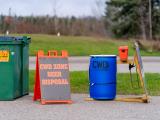Dec 30, 2004 (CIDRAP News) Canada today reported what could be its second case of bovine spongiform encephalopathy (BSE), only hours after the US government announced plans to ease restrictions on the importation of Canadian cattle.
The Canadian Food Inspection Agency (CFIA) said multiple screening tests of a 10-year-old dairy cow have indicated possible BSE, or mad cow disease. Confirmatory test results were expected in 3 to 5 days. The carcass was kept out of the human food and animal feed systems, the agency said.
The announcement comes on the heels of the US Department of Agriculture (USDA) announcement yesterday of plans to partially lift the current ban on importing of live Canadian cattle on Mar 7. Live Canadian cattle have been barred since Canada's first BSE case was discovered in May 2003. Because Canada is now considered a "minimal risk" region for BSE, the border will be reopened to live Canadian cattle less than 30 months of age and certain other animals and products, the USDA said.
The CFIA, in announcing the suspected BSE case, said, "The Government of Canada's normal policy is to report only confirmed results. However, given the unique situation created by the United States border announcement on December 29 it was decided that the most prudent action would be to publicly announce the available information and provide stakeholders with a full understanding of the current situation."
Canada's BSE-related measures have been based on the assumption that more cases may be found in North America, the CFIA said. "As a result, the confirmation of a new case of BSE would not indicate increased risk to food safety as Canada requires the removal of specified risk material (SRM) from all animals entering the human food supply," the agency said. SRM are tissues such as the brain, spinal cord, and certain nerve bundles, which are likely to contain the BSE agent if the animal has the disease.
The dairy cow was tested because it couldn't walk, putting it in a high-risk category in Canada's BSE surveillance program, officials said. The cow was born before Canada (and the United States) banned the feeding of protein from ruminant animals to other ruminants in 1997. "If BSE is confirmed in this case, consumption of contaminated feed before 1997 remains the most likely route of [BSE] transmission" to the cow, the CFIA said.
The agency said American officials had been informed of the suspected BSE case. "This finding should not have a significant or lasting impact on efforts to normalize trade," the statement said. "In negotiations with trading partners, including the U.S., Canada has been very open about the prospect of finding more BSE."
The CFIA did not say where the suspect cow came from or give any other identifying information about it. Officials said the Canadian Science Centre for Human and Animal Health in Winnipeg, Man., is handling the confirmatory testing.
See also:





















